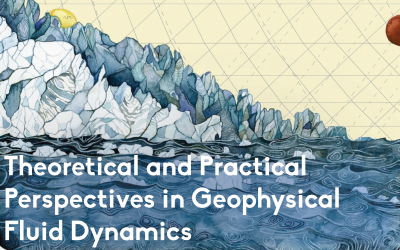The Earth’s climate is dictated by atmospheric and oceanic dynamics, spanning over a wide range of temporal and spatial scales that undergo multi-scale interactions resulting in energy transfers across a multitude of scales. The energy transfers across these multi-scale regimes are key to the understanding of the energy cycle, but their quantification remains poorly constrained. Physical processes such as turbulent mixing and instabilities are difficult to observe or resolve in the numerical models and are often parametrized. Consequently, the question of energy-consistent closure in ocean and climate models, which heavily rely on parametrizations, remains open and challenging to address. To address these questions, a combination of analytical theories, numerical models, and observational measurements is necessary to advance our understanding of oceanic and atmospheric dynamics.
The meeting spans two weeks addressing multi-scale and multi-physics topics in geophysical fluid dynamics including, but not limited to, eddies, waves, turbulence, instabilities, frontal dynamics, energy transfers and cascades, parameterizations, data science, data assimilation, and stochastic aspects of climate modeling from theory, models, and observations.
Week #1 (20th - 24th May, 2024):
Eddies, waves, eddy-wave interactions, turbulence, instabilities, and frontal dynamics from theory, models, and observations
Week #2 (27th - 31st May, 2024):
Energy transfers and cascades, parameterizations in models, machine learning in geophysical fluid dynamics, data assimilation, stochastic aspects of climate modelling
In addition to lectures, long research talks, and short lightning talks, the meeting program also includes tutorials on Vizualization with Python (Week #1) by Pablo Sebastia Saez (University of Hamburg, Germany) and Moritz Epke (MPI Meteorology, Germany), and on Machine Learning (Week #2) by Kaushik Srinivasan (University of California, USA).
This meeting aims at bringing together the state-of-the-art research in geophysical fluid dynamics, combining theory, numerical modeling, and observations, as well as emerging data science methods, promoting exchange between these fields and fostering future interdisciplinary interactions. This meeting is inspired by the workshop series organized within the framework of the German collaborative research project TRR181 (https://www.trr-
This meeting is the first of its kind in the field of geophysical fluid dynamics and climate science to be held in India, bringing together the aforementioned diverse scientific aspects and at the same time fostering scientific exchange and knowledge sharing among researchers worldwide.
Eligibility criteria: This meeting is open to PhD students, early-career and senior scientists working in the field of ocean, atmosphere, and climate sciences, as well as mathematics and geophysical fluid dynamics, or a related discipline. Master students are also welcome to attend.
Accommodation will be provided for outstation participants at our on-campus guest house.
ICTS is committed to building an environment that is inclusive, non-discriminatory and welcoming of diverse individuals. We especially encourage the participation of women and other under-represented groups.
 icts
icts res
res in
in- Other links


